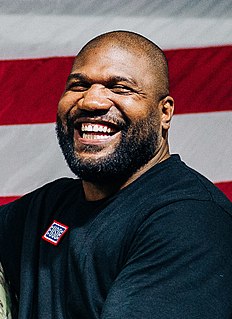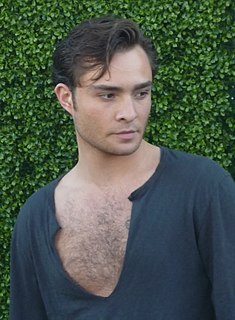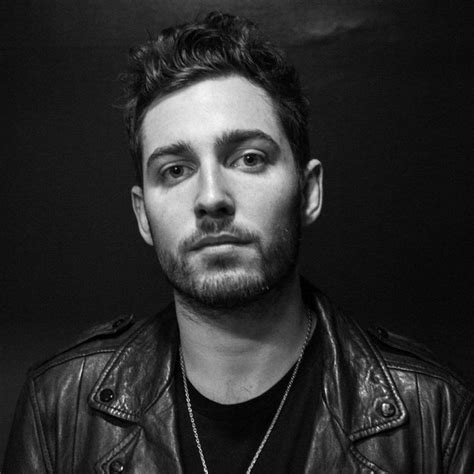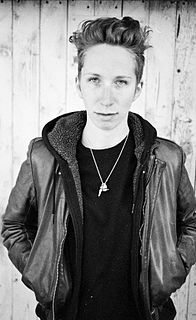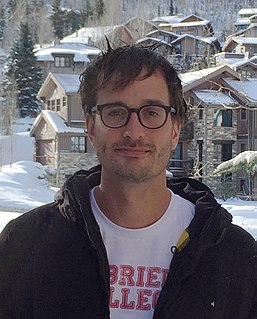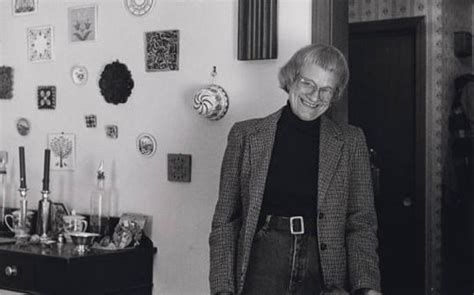A Quote by Lou Reed
The gay people know where I'm at. Straight people may not know where I'm at, but they find it kind of interesting when they show up and see what is sitting around them.
Quote Topics
Related Quotes
I was about 12 years old and I was sitting watching the television and it was some kind of talent show, you know, and on marches this monkey, this ape, in a pair of red-checked trousers with a little matching jacket holding a ukelele and it started jigging around playing it, and it was looking straight into the camera, straight at me, and I remember thinking, that's it, that'll be me, you know, that'll be me.
Not only do I not hate gay people, I actually accept them for who and what they are. They always seem happy and most of them I met are very kind and nice individuals. Yes, and like most straight guys I joke around with the whole gay thing and I see it as comedy, not saying that's right or wrong but I don't do it out of hate.
People think Chace is gay, and thought I was gay, that we were humping. It’s not true, but hilarious. People project their fantasies onto people. I’ve never been someone who makes it my objective to go out and pick up chicks. But I’ve met some fantastic ladies here. You know those amazing conversations where you find yourself in a café talking until 2 a.m. and never see them again.
People when they're growing up they just want to fit in, there are a lot of social pressures on young people today to kind of have it all figured out and know what they want to do, know who they are straight away and I've always tried to embrace that sense of pressure, but I've got people around me that do as well.
Gay people, certainly gay people of my generation, at least of a certain echelon - middle-class Americans - have binocular vision. We all are raised by straight people and grow up with straight people and in straight families, but we all have this totally other way of looking at things. Increasingly as I get deeper into middle age, that is why I resist plunking for any one camp. Because I have this delicious sort of experience of being able to see things in two ways.
You see a lot of interesting visual irony on movie sets all the time, you know duality, set illusions, the reality, all that stuff. You play with interesting materials that you couldn't afford to otherwise. You meet interesting people that you work with, have special machinists or mold makers and make-up people, and people who make prosthetic appliances for actress' faces. It's really interesting kind of witch's brew of people in that business, aside from the sleeze bags you hear about on the financial end.
It's unfortunate we live in a society where "gay" is an insult. To some of these boys, who are from really red states and have families with military history, to be called gay is the worst thing imaginable, and that's used against them. It's really interesting that these are the people drawn into the tickling world. If the people drawn into competitive endurance tickling, even if they were straight, came from liberal, accepting backgrounds, the backlash of calling them gay wouldn't be a problem. But it's a problem because of where these people are from. That's really fascinating to me.
As a comedian I don't think they look at me as a sexual person but I can see where with actors it would be a little difficult for them because its part of their mystique, it gives them an easier time to change characters and people aren't going oh we have a gay actor, their gay so I don't know if I'm gunna buy this guy with this girl, its weird, I don't think it's fair; it's only done with us, it seems, like they just accept everyone as straight and go along with it and then its oh their gay and make a big deal out of it.
Because bisexual people almost have a foot in the gay and the straight world, their friends can misunderstand them too. Like if a bisexual man starts dating another man, people are like 'Ah, he's gay,' but you know, bisexual people remain bisexual, and their attractions can change and flux over time.
My writing books with positive gay characters has come more out of anger than anything else: anger at not having been able to find honest, accurate books about people like myself as a teen, books that show we're as diverse as straight people and that we can lead happy, healthy, productive lives just as straight people can.
The ball scene was never really only gay people. I think people have this notion that if there's a man hanging around a gay man, he must be gay, but that's just stigma. Back in the day, it was the same; there were lots of different people there: gay, straight, whatever. They did not care what they were called because they knew who they were.




